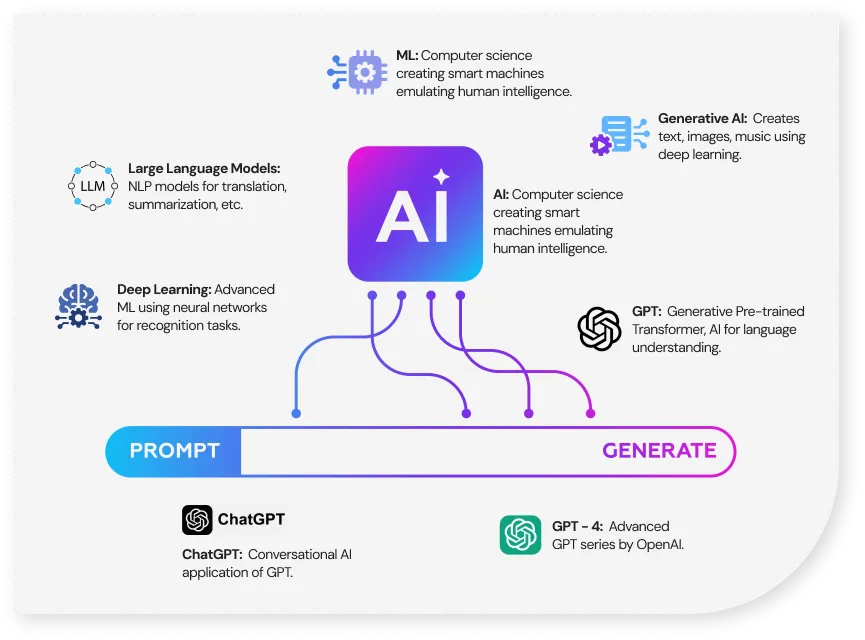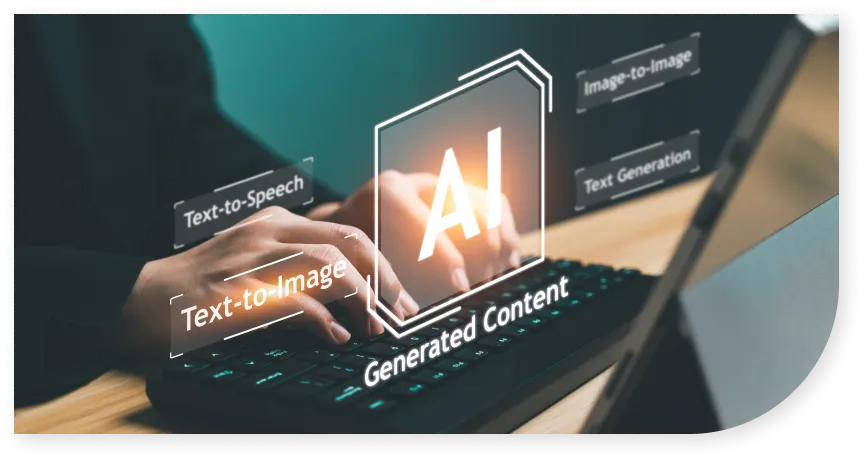AI Emerging Technology
Emerging Technology
Artificial Intelligence (AI) is revolutionizing the world of Marketing, Workforce Management, & Sales by transforming traditional approaches into highly strategic and data-driven processes. The integration of AI technologies into sales strategy and execution is reshaping how businesses engage with customers, optimize operations, and drive revenue growth

Enhanced Customer Insights
AI empowers sales teams with a deeper understanding of their customers. Machine learning algorithms analyze vast amounts of data to uncover valuable insights into customer preferences, behavior, and pain points. This knowledge enables sales professionals to tailor their strategies and messaging, providing a more personalized and compelling customer experience.
Conversational AI
Conversational AI refers to technologies, like chatbots and virtual assistants, that use artificial intelligence to enable computers to understand, process, and respond to human language in a natural and intelligent way. It involves several AI components, including natural language processing (NLP), machine learning (ML), and sometimes speech recognition, to facilitate an interactive and personalized communication experience between humans and machines.
Real-time Personalized Recommendations
AI-driven recommendation systems analyze customer data to provide personalized product recommendations in real-time. This enhances cross-selling and upselling opportunities and improves the overall customer experience. Sales teams can leverage these recommendations to offer tailored solutions and increase revenue.
Voice Analytics for Sales Calls
Machine learning algorithms analyze sales call recordings to extract insights into sales team performance, customer sentiment, and sales effectiveness. This data-driven approach provides valuable coaching and training opportunities to improve sales outcomes and refine sales strategies.
Synthetic Data
Synthetic data can be effectively used in sales, sales processes, sales automation, and marketing. In marketing, synthetic data helps address privacy concerns and enables risk-free experimentation by mimicking real consumer behavior without using actual customer data. It is used to optimize pricing strategies, enhance marketing automation, conduct A/B tests, and create realistic consumer profiles. In sales processes, synthetic data can simulate customer interactions and behaviors, aiding in the development of personalized strategies and improving decision-making.
Continuous Improvement Culture
AI encourages a culture of continuous improvement within sales teams. Teams can experiment, share best practices, and regularly evaluate and refine their strategies based on data-driven insights. This iterative approach leads to ongoing enhancement of sales effectiveness.
AI encourages a culture of continuous improvement within sales teams. Teams can experiment, share best practices, and regularly evaluate and refine their strategies based on data-driven insights. This iterative approach leads to ongoing enhancement of sales effectiveness.
First Things First
Generative AI & Language Technology Essentials

In this series of deep dives, we’ll explore how AI is transforming Marketing, Workforce Management, and Sales, giving forward-thinking organizations the competitive edge they need to thrive in today’s fast-paced market.


AI & Marketing
In today's digital landscape, artificial intelligence (AI) and machine learning (ML) are transforming marketing and sales strategies. These technologies offer innovative tools and solutions that can significantly enhance customer engagement, streamline processes, and boost return on investment (ROI). Below, we'll explore various marketing and sales tools commonly used by organizations and how AI and MCodeL can optimize their performance.
Customer Relationship Management (CRM) Tools
- Salesforce: A leading CRM platform, Salesforce, utilizes AI to predict future sales and ML to automate routine tasks. This improves sales team efficiency and targeting, leading to a better ROI.
- HubSpot CRM: HubSpot's CRM leverages AI for lead scoring and ML for email personalization. This enhances lead conversion rates and email engagement, resulting in improved ROI.
- Zoho CRM: Zoho CRM employs AI to recommend upsell opportunities and ML to refine lead scoring accuracy. This leads to more targeted sales efforts and better ROI.
Email Marketing and Automation
- Mailchimp: Mailchimp uses AI for list segmentation and ML for optimizing email send times. This increases email open rates and ROI.
- Constant Contact: Constant Contact employs AI for content personalization and ML for campaign performance analysis. This improves email marketing effectiveness and ROI.
- SendinBlue: SendinBlue uses AI to predict customer churn and ML to optimize email content. This enhances customer retention and email engagement, resulting in a better ROI.
Marketing Automation Platforms
- HubSpot Marketing Hub: HubSpot's Marketing Hub employs AI for personalized website content and ML for customer journey analysis. This leads to increased website engagement and ROI.
- Marketo: Marketo utilizes AI for lead scoring and ML for lead nurturing optimization. This improves lead conversion rates and ROI.
- Eloqua (by Oracle): Eloqua employs AI for identifying high-value leads and ML for campaign outcome prediction. This leads to more efficient lead targeting and better ROI.
Social Media Management and Publishing
- Hootsuite: Hootsuite uses AI for sentiment analysis and ML for content optimization. This enhances social media engagement and ROI.
- Buffer: Buffer employs AI for content topic recommendations and ML for campaign performance tracking. This leads to improved social media results and ROI.
- Sprout Social: Sprout Social utilizes AI for detecting social media mentions and ML for automated responses. This improves customer satisfaction and social media ROI.
Content Management and Publishing
- WordPress: WordPress uses AI for content topic suggestions based on SEO trends and ML for content optimization based on user engagement. This leads to improved organic traffic and ROI.
- Drupal: Drupal employs AI for website search optimization and ML for content placement analysis. This results in better user experiences and website ROI.
- Joomla: Joomla uses AI for enhancing website search functionality and ML for user behavior analysis. This leads to optimized content placement and improved ROI.
SEO (Search Engine Optimization) Tools
- Moz: Moz utilizes AI for competitor analysis and ML for keyword optimization suggestions. This improves SEO performance and ROI.
- SEMrush: SEMrush employs AI for keyword performance prediction and ML for backlink analysis. This leads to enhanced organic traffic and ROI.
- Ahrefs: Ahrefs uses AI for identifying low-competition keywords and ML for keyword ranking tracking. This results in better SEO rankings and ROI.
Web Analytics Tools
- Google Analytics: Google Analytics employs AI for user behavior analysis and ML for website change suggestions. This enhances website performance and ROI.
- Adobe Analytics: Adobe Analytics utilizes AI for customer segmentation and ML for marketing channel analysis. This leads to better-targeted marketing efforts and ROI.
- Mixpanel: Mixpanel employs AI for user engagement pattern detection and ML for product feature recommendations. This enhances customer retention and product ROI.
Lead Generation and Capture
- Leadfeeder: Leadfeeder uses AI for lead prioritization and ML for lead behavior analysis. This leads to more effective lead nurturing and ROI.
- OptinMonster: OptinMonster employs AI for personalized pop-ups and ML for A/B testing lead capture strategies. This improves lead conversion rates and ROI.
- Leadpages: Leadpages utilizes AI for landing page design suggestions and ML for landing page performance analysis. This results in better conversion rates and ROI.
Sales Enablement Tools
- ClearSlide: ClearSlide uses AI for sales presentation analysis and ML for content recommendations. This improves sales team efficiency and effectiveness, leading to better ROI.
- Highspot: Highspot employs AI for content identification and ML for sales coaching insights. This enhances sales strategies and ROI.
- Seismic: Seismic utilizes AI for content organization and ML for content recommendations. This leads to more effective sales processes and improved ROI.
These tools, enhanced with AI and ML capabilities, empower organizations to make data-driven decisions, deliver personalized customer experiences, and automate routine tasks. This ultimately results in more efficient marketing and sales strategies and a higher return on investment (ROI).

AI & Workforce Management, Staffing,
and Human Capital Management
The landscape of workforce management and human capital is undergoing a significant transformation, largely due to the integration of AI and GPT technologies. Staffing organizations, HR professionals, and candidates need to stay ahead of these changes, as new tools and processes redefine the way talent is sourced, managed, and optimized. This deep dive explores the latest tools, trends, and processes driving innovation in workforce management, staffing, and human capital management.
AI & Predictive Analytics in Workforce Management
Predictive Analytics has become a core feature of AI-driven workforce management tools. By analyzing historical workforce data, AI can predict future staffing needs, workforce turnover, and skills gaps, allowing organizations to make proactive hiring and training decisions.
Approach:
AI-based workforce platforms analyze trends such as employee performance, industry growth, and labor market shifts to predict demand for certain roles or skill sets. Staffing organizations use these insights to stay ahead of client needs, ensuring a pipeline of qualified candidates ready for deployment.
Key Tools:
Platforms like Workday Adaptive Planning and ADP DataCloud leverage predictive analytics to optimize workforce planning and reduce operational inefficiencies.
AI-Powered Recruitment Tools
AI and GPT technologies are revolutionizing the recruitment process, automating tasks such as resume screening, interview scheduling, and candidate matching.
Approach:
AI recruitment platforms use machine learning algorithms to scan thousands of resumes and match them with job descriptions more efficiently than manual methods. These tools can also conduct behavioral analysis based on candidates’ past experiences, assessing soft skills and cultural fit.
Key Tools:
Eightfold AI and HireVue are leading AI-powered recruitment platforms that assist in resume parsing, candidate assessments, and interview scheduling, all while reducing human bias in hiring decisions.
GPT-Driven Candidate Engagement
Engaging with potential candidates through AI-driven chatbots and virtual assistants is becoming a standard practice in staffing and recruitment.
Approach:
GPT-powered chatbots streamline communication by handling repetitive inquiries, providing 24/7 assistance, and offering personalized job recommendations to candidates. For staffing firms, this reduces the burden on recruiters, allowing them to focus on high-value activities like relationship building and interviewing top talent.
Key Tools:
Mya and Olivia are two AI-driven conversational platforms that specialize in candidate engagement, using natural language processing (NLP) to offer dynamic, personalized interactions at scale.
Intelligent Skill Matching & Talent Mapping
AI's ability to match candidate skills with job requirements is improving the accuracy and speed of placements in both permanent and temporary staffing.
Approach:
Using machine learning algorithms, these tools assess not just the technical skills of candidates but also soft skills, career trajectory, and even predicted job satisfaction levels. Staffing firms can use this data to match candidates with roles where they are likely to thrive and remain for the long term.
Key Tools:
LinkedIn Talent Insights and Pymetrics leverage AI to map talent pools, helping HR teams and staffing agencies identify top performers and align them with high-value opportunities.
AI in Performance Management & Employee Retention
AI's role in performance management is creating new ways to ensure employee engagement and retention by identifying potential disengagement or burnout early.
Approach:
AI tools monitor employee performance data, including key performance indicators (KPIs), engagement scores, and feedback. By identifying trends in performance or sentiment, these platforms help managers intervene with personalized support, mentoring, or upskilling, thereby reducing turnover.
Key Tools:
Lattice and 15Five use AI to continuously monitor employee satisfaction and performance metrics, providing insights into potential retention risks and engagement strategies.
GPT-Enhanced Learning & Development (L&D)
AI-driven learning platforms are increasingly important in providing tailored, on-demand training programs, accelerating skill development, and preparing the workforce for future challenges.
Approach:
GPT and AI-powered systems can recommend personalized learning paths based on employee roles, career goals, and emerging industry trends. These platforms also create interactive learning environments through AI tutoring, offering real-time feedback and dynamically adjusting training material to the learner’s pace and proficiency.
Key Tools:
Udemy for Business and Coursera for Teams both incorporate AI to recommend courses that align with company goals and individual career development plans, boosting workforce upskilling efforts.
Automation of Workforce Administration
Workforce management systems now automate administrative tasks such as timekeeping, payroll, benefits administration, and compliance monitoring.
Approach:
AI enhances back-office operations by processing large volumes of employee data, flagging inconsistencies, and ensuring regulatory compliance. This reduces the administrative burden on HR teams, allowing them to focus on strategic initiatives.
Key Tools:
UKG (Ultimate Kronos Group) and SAP SuccessFactors are leading AI-driven workforce management platforms that automate HR tasks such as payroll processing, time tracking, and benefits management.
The Bottom Line
AI and GPT technologies are not only enhancing but reshaping workforce management, staffing, and human capital processes. From predictive analytics that forecast workforce needs to GPT-powered chatbots that engage candidates 24/7, these innovations are allowing staffing organizations to become more agile, efficient, and strategic. AI tools improve hiring outcomes, reduce biases, and create more personalized and efficient pathways for both organizations and candidates to thrive.
For staffing organizations and human capital leaders, integrating AI solutions into their processes is no longer optional—it’s essential. By embracing AI-driven tools and methodologies, firms can gain a competitive advantage in attracting, retaining, and developing top talent.

AI & Sales Methodologies
In the world of sales, adopting the right methodology can make all the difference. Here, we explore three distinct sales methodologies: Challenger, Consultative Selling, and the Shipley Associates sales system. Each of these approaches offers unique strategies and tactics to excel in the sales process.
Best sales management tool to boost your business.
Subscribe to our weekly newsletter



